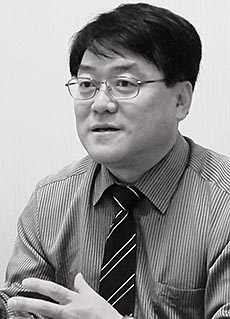Any meaningful discourse on inter-Korean integration in the context of unification must address matters of transitional justice and reparations. It is widely believed that the success or failure of this process will significantly influence the future development of the unified state.
Considering Germany, the most common case extrapolated to the Korean Peninsula, there are still signs that, even with the implementation of an institutionalized process including judicial investigations and sentencing of past wrongdoings, actual integration within German society is still ongoing at present. This lends more weight to the growing call for greater detail and in-depth discussions on actionable plans for the two Koreas.
 “It is true that there is a lot of work to do to prepare for reunification given the cause of the division between the South and North and the aggravated sense of hostility and conflict,” Park Jeong Won (pictured left), director of the Integrated Transitional Justice Institute told Daily NK. He added that the complexity of the issue is even greater in the case of the Koreas on account of their history of civil war.
“It is true that there is a lot of work to do to prepare for reunification given the cause of the division between the South and North and the aggravated sense of hostility and conflict,” Park Jeong Won (pictured left), director of the Integrated Transitional Justice Institute told Daily NK. He added that the complexity of the issue is even greater in the case of the Koreas on account of their history of civil war.In order to create a unified Korean state of the future, wherein the citizens of both Koreas are content, we need to attain true integration; that is, true integration among people,” Park explained, noting, “Procedural reunification is completed through integration on the psychological level. In this sense, we need to review the issue of settling past transgressions.”
Additionally, he said he believes successful resettlement of North Korean defectors in the South could be used as a litmus test for the post-unification era. “The process of supporting defectors for their resettlement is not merely a problem of inter-Korean unification; it is also receiving attention internationally, as an example of transitional justice and reckoning with the past,” Park noted, adding that dealing with North Korean defectors will help the South find ways to resolve issues of justice with the North and accumulate experience ahead of time.
Those hailing from North Korea, the “direct victims” of Pyongyang’s transgressions, must be within the circle of people leading the process of transitional justice. Therefore, the director said, preparations must be made specifically to reflect their demands rather than what pundits and practitioners deem them to be.
“This is why it is essential to build a foundation for an awareness of human rights and education on being a democratic citizen in the North so that they can choose a rational method of transitional justice,” Park noted.
Devising and applying an effective mechanism to deal with human right violations perpetuated by the regime in order to ensure harmony and reconciliation post unification is imperative. “Since it is impossible to deal with it immediately, we must seek appropriate methods that can be utilized pursuant to discernible changes within the North Korean regime,” he explained.
Finding ways to implement the North Korean Human Rights Act, which was passed this year in the South, and using the database on North Korean human rights violations are just some of the tools some of the specific approaches the government and the private sector can take in conjunction, Park added.
Also, as an expert in constitutional law, the director said as of now, the prevailing assertion on whether the North can be effectively be ruled by the governance of law is negative. Nonetheless, the director said there are signs of practicality that can be detected in Pyongyang’s moves to reflect changes in its economic makeup within its legal framework even as it strengthens rules designed to protect and uphold the regime.
“For example,” he said, “North Korea’s constitution has been amended to reflect the change in governing bodies in accordance with the successive leaderships (Kim Il Sung, Kim Jong Il, and Kim Jong Un). At the same time, legislation on foreign investment, foreign economic cooperation, special economic zones, etc., also indicate the transformations seen in the North’s economy.”

















